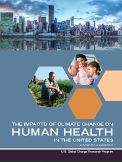The impacts of climate change on human health in the United States: a scientific assessment
 This scientific assessment examines how climate change is already affecting human health and the changes that may occur in the future. It aims at providing a comprehensive, evidence-based, and, where possible, quantitative estimation of observed and projected climate change related health impacts in the United States. It has been developed to inform public health officials, urban and disaster response planners, decision makers, and other stakeholders within and outside of government who are interested in better understanding the risks climate change presents to human health. The study finds that as the climate continues to change, the risks to human health will grow, worsening existing health threats and creating new public health challenges. Nearly all of the health threats, from increases in human exposure to excessive heat to more frequent, severe or longer-lasting extreme weather events to degraded air quality to diseases transmitted through food, water, and vectors (such as ticks and mosquitoes) are expected to worsen. Some special populations of concern, such as children, the elderly, outdoor workers and those living in disadvantaged communities, will be more vulnerable.
This scientific assessment examines how climate change is already affecting human health and the changes that may occur in the future. It aims at providing a comprehensive, evidence-based, and, where possible, quantitative estimation of observed and projected climate change related health impacts in the United States. It has been developed to inform public health officials, urban and disaster response planners, decision makers, and other stakeholders within and outside of government who are interested in better understanding the risks climate change presents to human health. The study finds that as the climate continues to change, the risks to human health will grow, worsening existing health threats and creating new public health challenges. Nearly all of the health threats, from increases in human exposure to excessive heat to more frequent, severe or longer-lasting extreme weather events to degraded air quality to diseases transmitted through food, water, and vectors (such as ticks and mosquitoes) are expected to worsen. Some special populations of concern, such as children, the elderly, outdoor workers and those living in disadvantaged communities, will be more vulnerable.
Related Content
- Order of the National Green Tribunal regarding illegal mining and stone crushing units in Rajmahal hills, Sahebganj, Jharkhand, 23/09/2020
- 19th century Indian diet: rice fights wheat
- Climate change, sustainable development and security are coming together, and Asia must drive the post-2015 global agenda and global goals
- Global sustainable development goals: Sustainability is about the use, Distribution and scarcity of natural resources - Eradicating poverty and saving the climate
